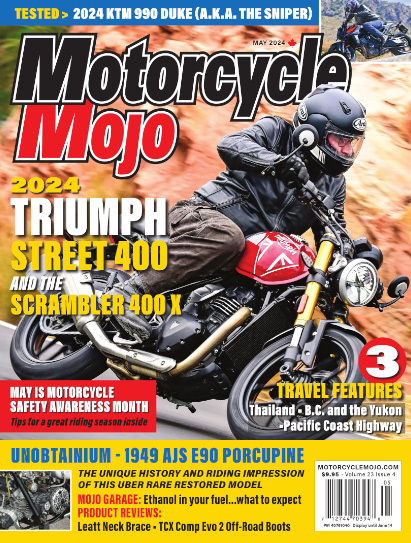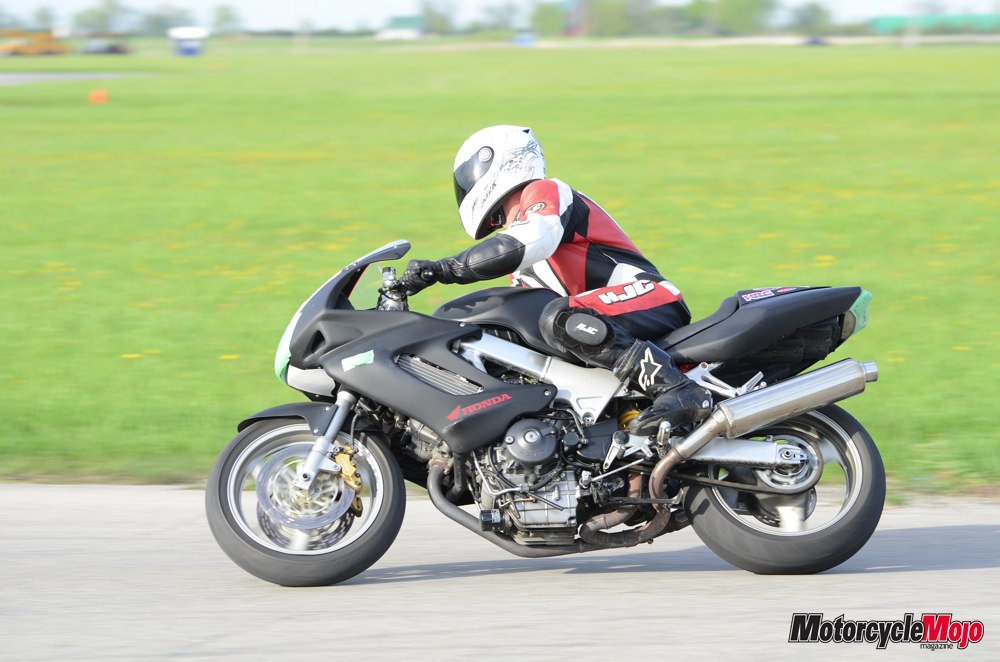In his 1994 review of the Ducati 900 SP, gonzo journalist Hunter S. Thompson wrote that “you have to be a little crazy to ride these super-torque, high-speed crotch rockets anywhere except a racetrack – and even there, they will scare the whimpering shit out of you.”
The vicious monster that was the subject of Thompson’s passionate description produced around 80 horsepower and 62 ft-lb of torque, decent enough numbers in the mid-nineties, but arguably modest by today’s performance standards. In fact, there are so many motorcycles available now – and not just sportbikes – that exceed the 900 SP’s capabilities that Thompson’s message is more noteworthy than ever.
One of the few frustrations with owning a modern motorcycle, even one as small as our long-term Honda CBR250R, is that it’s impossible to ride it anywhere near its peak performance and still remain a reasonably safe and law-abiding citizen. The only viable option for those who would actually like to explore their own limits, along with those of their machines, is to ride in a controlled environment free from opposing traffic, speed limits and cops. And that means taking it to the track.
There are many motorcycle owners who enjoy riding their bikes hard, yet balk at the idea of actually using a racetrack. Others have themisconception that track days are solely the domain of sportbikes. We recently attended a five-hour course designed to help motorcyclists unsure about riding on a racetrack to transition into confident track day participants. Conducted at Toronto Motorsports Park (TMP), Introduction to Track Day Riding is the product of Guys with Bikes, a self-described group of motorcycle enthusiasts and industry professionals who have years of experience running track days, including those regularly held at TMP’s combination drag strip and road-course facility.
Guys with Bikes recognized a need to assist uncertain and aggressive riders alike to find their sea legs on a road course. Their goal, to provide a fun, pressure-free environment for track newbies to get their feet wet, provides an opportunity to sample what you can expect on the track. However, it’s not for everyone; just as there are those who will evolve into regular track day participants, there are others who will regard it as an interesting and exciting experience that they won’t necessarily want to repeat. And although the course effectively dispels misconceptions that racetracks are dangerous, the presence of a vigilant ambulance trackside is a constant reminder that it is a place to respect.
Requirements for participation in the course are straightforward and carefully detailed in an online handout: every rider must wear full leathers, a DOT approved full-face helmet, leather gloves that cover the wrists and boots that don’t have dangling laces. Since participants are using their own motorcycles, each machine must also pass a tech inspection before it will be allowed on the track. Everything has to do with safety – not only the rider’s, but also those who are sharing the track that day.
Putting your bike on a track requires a little preparation, the most onerous of which is swapping the anti-freeze in liquid-cooled engines with water. The rest is easy and straightforward. Motorcycles must be free of mechanical issues, throttles must automatically close, all glass and plastic lenses – including mirrors – must be covered with tape, there can’t be fluid leaks of any kind, tires and brakes must be in good condition, kill switches must be functional, and finally, the speedometer portion of your instruments must be concealed (a rider distracted by checking speed before an approaching turn will quickly find out what running off a track feels like).
The course curriculum consists of both class and track time. In the classroom, students are given a cursory introduction to the principles of motorcycle dynamics along with the skills that must be mastered in order to lap a motorcycle quickly. The theory is of immediate interest to those who plan to push their skills, but it’s also of value to the more casual rider; concepts that involve aspects of traction and braking are also applicable to street riding. Interestingly, science puts into words what most riders have only been aware of instinctively. For example, everyone knows how to steer a motorcycle, but will begin to look puzzled when you start to discuss countersteering, throttle steering, lean and body positioning.
An hour and change is around the limit that you’ll be able to hold the attention of a room full of motorcyclists who have their bikes waiting for them at the edge of a racetrack. The class is broken up into five small groups with one instructor each at the end of the session. It’s an essential step, as it places riders of similar skill and comfort levels together and helps to ensure that no one feels pressured to keep up once on the track.
After suiting up, everyone gets their first view of the track by performing sighting laps, a simple exercise in which everyone follows their instructor in single file at a slow speed around the course. Not only does this give everyone an idea of the track’s layout and the types of turns it has, it also demonstrates the quickest line through them. At the end of each track session, riders are debriefed by their instructor, who gives advice and corrects mistakes. Instead of bombarding excited track neophytes with too much information at once, Guys with Bikes slowly adds detailed information in stages as it’s needed and then evaluates everyone to see how much of it they have absorbed.
Back on the track again, we play follow the leader, with each student taking a turn riding an entire lap directly behind the instructor, but at a quicker pace. This reinforces the importance of a bike’s position on the track and using the right line through a turn, vital information that is easy to miss when you’re riding behind other students.
The balance of the track time is dedicated to open sessions that allow everyone to lap at their own pace. The emphasis now is on building up speed slowly and being smooth with every input, whether it’s braking, accelerating or turning. Throughout these sessions, instructors will individually follow the riders in their groups and scrutinize their technique before providing more constructive input between sessions.
At the end of the day, there’s a real buzz in the group. Looking at the beaming faces, you can see that many have been genuinely excited by the experience, and I overhear some already describing plans to attend a track day on their own. A few look reflective, undoubtedly still trying to decide if this is something that they’ll pursue in the future. One thing is certain: regardless of what you ride, you owe it to yourself to experience your motorcycle in this type of setting at least once. Those local to Southern Ontario can point their web browsers to TMP’s website (www.torontomotorsportspark.com) for more information. For other areas, please locate your closest road course and inquire if they offer a similar program. At the very least, I guarantee that you’ll discover some of the impressive performance that lurks within your machine, and who knows, you might even discover something about yourself in the process.










